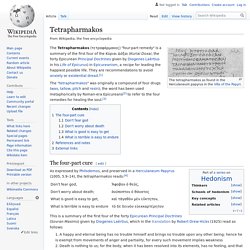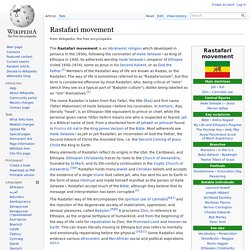

If you're unemployed, it's not because there isn't any work. Anarkisme og film « SORTE FANE BLOG. Tetrapharmakos. The Tetrapharmakos (τετραφάρμακος) "four-part remedy" is a summary of the first four of the Κύριαι Δόξαι (Kuriai Doxai, the forty Epicurean Principal Doctrines given by Diogenes Laërtius in his Life of Epicurus) in Epicureanism, a recipe for leading the happiest possible life.

They are recommendations to avoid anxiety or existential dread.[1] The four-part cure[edit] As expressed by Philodemos, and preserved in a Herculaneum Papyrus (1005, 4.9–14), the tetrapharmakos reads:[4] This is a summary of the first four of the forty Epicurean Principal Doctrines (Sovran Maxims) given by Diogenes Laërtius, which in the translation by Robert Drew Hicks (1925) read as follows: 1. Rastafari movement. The Rastafari movement is an Abrahamic religion which developed in Jamaica in the 1930s, following the coronation of Haile Selassie I as King of Ethiopia in 1930.

Its adherents worship Haile Selassie I, emperor of Ethiopia (ruled 1930–1974), some as Jesus in his Second Advent, or as God the Father.[1] Members of the Rastafari way of life are known as Rastas, or the Rastafari. The way of life is sometimes referred to as "Rastafarianism", but this term is considered offensive by most Rastafari, who, being critical of "isms" (which they see as a typical part of "Babylon culture"), dislike being labelled as an "ism" themselves.[2] The name Rastafari is taken from Ras Tafari, the title (Ras) and first name (Tafari Makonnen) of Haile Selassie I before his coronation. In Amharic, Ras, literally "head", is an Ethiopian title equivalent to prince or chief, while the personal given name Täfäri (teferi) means one who is respected or feared.
World-views and doctrines[edit]
Quote. Træning. Anti autoritær.